#the river rabbis
Text
the queer Jewish text nerd mood is just screaming crying throwing up about David and Jonathan on loop. bonus for the queer Talmud nerds: screaming crying throwing up about Yochanan and Reish Lakish!!!!
#g-d. them.#david and jonathan#yochanan and reish lakish#jumblr#I need to go listen to youth by daughter again and stare into space#the river rabbis#surpassing the love of women
17 notes
·
View notes
Text
📍Cascate di Saent, Val di Rabbi, Italy 🇮🇹
#video#paradise#view#nature#paraiso#natureza#explore#travel#trip#lake#river#cascade#waterfall#cachoeira#cascada#cascate#italy#italia#val di rabbi#adventure#landscape#hikes#hiking#music#fall#autumn#falling leaves
921 notes
·
View notes
Text
instagram
#jewish rabbi elhanan beck#zionism#occupation#free palestine#gaza#israel#west bank#zionism explained#from the river to the sea palestine will be free#Instagram
1 note
·
View note
Video
youtube
The Feast Of Tabernacles JUST Happened & Now They Start Building the Thi...
#feast of tabernacles#sukkot#temple#jewish#christian#messiah#antichrist#euphrates#river#holy#3#israel#jerusalem#rabbis#talmud#bible#god#jesus#rapture#imminent#maranatha
4 notes
·
View notes
Text
Distracting myself by daydreaming about writing BL about R' Yochanan/Reish Lakish.
This is a real thing that really happened (according to the Talmud, anyway). An extremely beautiful scholar (Rabbi Yochanan) convinces a bandit king (Reish Lakish, or Rabbi Shimon ben Lakish) to become his "study partner" and rejoin society as a well-respected scholar. This is a BL plot fr and yet no one has written that gay shit.
There’s so much potential for stories set in the Amoraic period but gay Jewish shit centered on the era is nonexistent.
#Levitical prohibitions notwithstanding#amoraim#rav yochanan#the most beautiful rabbi#seduces a bandit leader back to society#with the power of bathing in the river
4 notes
·
View notes
Text
Gods it feels weird celebrating Hanukkah this year. My family went to a lighting ceremony at the cultural arts center because my sister was supposed to help light the menorah. My mom and I left right after it was lit, my mom because she didn't want to be tempted by the jelly donuts and me because the Vibes Were Starting To Go Off.
#the rabbi was dancing around the topic of the palestinian genocide and I couldn't tell if he was pro or anti zionism#the other event organizer was Very Obviously pro-israel and it made me extremely uncomfortable#from the river to the sea palestine will be free
1 note
·
View note
Text
in honor of that anon who said jews have done nothing for the world, here’s a non exhaustive list of things we’ve done for the world:
arts, fashion, and lifestyle:
jeans - levi strauss
modern bras - ida rosenthal
sewing machines - isaac merritt singer
modern film industry - carl laemmle (universal pictures), adolph zukor (paramount pictures), william fox (fox film forporation), louis b. mayer (mgm - metro-goldwyn-mayer), harry, sam, albert, and jack warners (warner bros.), steven spielberg, mel brooks, marx brothers
operetta - jacques offenbach
comic books - stan lee
graphic novels - will eisner
teddy bears - morris and rose michtom
influential musicians - irving berlin, stephen sondheim, benny goodman, george gershwin, paul simon, itzhak perlman, leonard bernstein, bob dylan, leonard cohen
artists - mark rothko
actors - elizabeth taylor, jerry lewis, barbara streisand
comedians - lenny bruce, joan rivers, jerry seinfeld
authors - judy blume, tony kushner, allen ginsberg, walter mosley
culture:
esperanto - ludwik lazar zamenhof
feminism - betty friedan, gloria steinem, ruth bader ginsberg
queer and trans rights - larry kramer, harvey milk, leslie feinberg, abby stein, kate bornstein, frank kameny, judith butler
international women's day - clara zetkin
principles of journalizm, statue of liberty, and pulitzer prize - joseph pulitzer
"the new colossus" - emma lazarus
universal declaration of human rights - rene samuel cassin
holocaust remembrance and human rights activism - elie wiesel
workers rights - louis brandeis, rose schneiderman
public health care, women's rights, and children's rights - lillian wald
racial equity - rabbi abraham joshua heschel, julius rosenwald, andrew goodman, michael schwerner
political theory - hannah arendt
disability rights - judith heumann
black lives matter slogan and movement - alicia garza
#metoo movement - jodi kantor
institute of sexology - magnus hirschfeld
technology:
word processing computers - evelyn berezin
facebook - mark zuckerberg
console video game system - ralph henry baer
cell phones - amos edward joel jr., martin cooper
3d - leonard lipton
telephone - philipp reis
fax machines - arthur korn
microphone - emile berliner
gramophone - emile berliner
television - boris rosing
barcodes - norman joseph woodland and bernard silver
secret communication system, which is the foundation of the technology used for wifi - hedy lamarr
three laws of robotics - isaac asimov
cybernetics - norbert wiener
helicopters - emile berliner
BASIC (programming language) - john george kemeny
google - sergey mikhaylovich brin and larry page
VCR - jerome lemelson
fax machine - jerome lemelson
telegraph - samuel finley breese morse
morse code - samuel finley breese morse
bulletproof glass - edouard benedictus
electric motor and electroplating - boris semyonovich jacobi
nuclear powered submarine - hyman george rickover
the internet - paul baran
icq instant messenger - arik vardi, yair goldfinger,, sefi vigiser, amnon amir
color photography - leopold godowsky and leopold mannes
world's first computer - herman goldstine
modern computer architecture - john von neumann
bittorrent - bram cohen
voip internet telephony - alon cohen
data archiving - phil katz, eugene roshal, abraham lempel, jacob ziv
nemeth code - abraham nemeth
holography - dennis gabor
laser - theodor maiman
instant photo sharing online - philippe kahn
first automobile - siegfried samuel marcus
electrical maglev road - boris petrovich weinberg
drip irrigation - simcha blass
ballpoint pen and automatic gearbox - laszlo biro
photo booth - anatol marco josepho
medicine:
pacemakers and defibrillators - louise robinovitch
defibrillators - bernard lown
anti-plague and anti-cholera vaccines - vladimir aronovich khavkin
polio vaccine - jonas salk
test for diagnosis of syphilis - august paul von wasserman
test for typhoid fever - ferdinand widal
penicillin - ernst boris chain
pregnancy test - barnhard zondek
antiretroviral drug to treat aids and fight rejection in organ transplants - gertrude elion
discovery of hepatitis c virus - harvey alter
chemotherapy - paul ehrlich
discovery of prions - stanley prusiner
psychoanalysis - sigmund freud
rubber condoms - julius fromm
birth control pill - gregory goodwin pincus
asorbic acid (vitamin c) - tadeusz reichstein
blood groups and rh blood factor - karl landsteiner
acyclovir (treatment for infections caused by herpes virus) - gertrude elion
vitamins - caismir funk
technique for measuring blood insulin levils - rosalyn sussman yalow
antigen for hepatitus - baruch samuel blumberg
a bone fusion technique - gavriil abramovich ilizarov
homeopathy - christian friedrich samuel hahnemann
aspirin - arthur ernst eichengrun
science:
theory of relativity - albert einstein
theory of the electromagnetic field - james maxwell
quantum mechanics - max born, gustav ludwig hertz
quantum theory of gravity - matvei bronstein
microbiology - ferdinand julius cohn
neuropsychology - alexander romanovich luria
counters for x-rays and gamma rays - robert hofstadter
genetic engineering - paul berg
discovery of the antiproton - emilio gino segre
discovery of cosmic microwave background radiation - arno allan penzias
discovery of the accelerating expansion of the universe - adam riess and saul merlmutter
discovery that black hole formation is a robust prediction of the general theory of relativity - roger penrose
discovery of a supermassive compact object at the center of the milky way - andrea ghez
modern cosmology and the big bang theory - alexander alexandrovich friedmann
stainless steel - hans goldschmidt
gas powered vehicles
interferometer - albert abraham michelson
discovery of the source of energy production in stars - hans albrecht bethe
proved poincare conjecture - grigori yakovlevich perelman
biochemistry - otto fritz meyerhof
electron-positron collider - bruno touschek
3K notes
·
View notes
Text
If you ask a non-jew what is the symbol of a Jewish wedding they will say it's breaking a glass. But why?
What you don't know is that when the groom breaks the glass the couple are already married. The rabbi has technically already pronounced them husband and wife (though there isn't really that part in a Jewish wedding).
The glass is crushed to represent the grief of the destruction of the temple. The groom says "If I forget you Jerusalem may my right hand be lost, may my tongue stick to the roof of my mouth if I don't remember you and don't put Jerusalem at the top of my joy" (my translation) Even at the happiest event of our lives we will always remember Jerusalem and Zion (i.e Israel) and how it was destroyed and how we were exiled from it. Then and only then, you may kiss the bride.
The verse is from the same psalm that starts with "By the rivers of Babylon, there we sat down, yea, we wept, when we remembered Zion"
This has been Jewish tradition for over 2,000 years and it doesn't matter if it was Jews in Europe, Africa, Asia - we always yearned to return to the land of Israel.
So if you say we aren't indiginous to the land of Israel or that we have no claim to the land, you need to educate yourself.
648 notes
·
View notes
Text
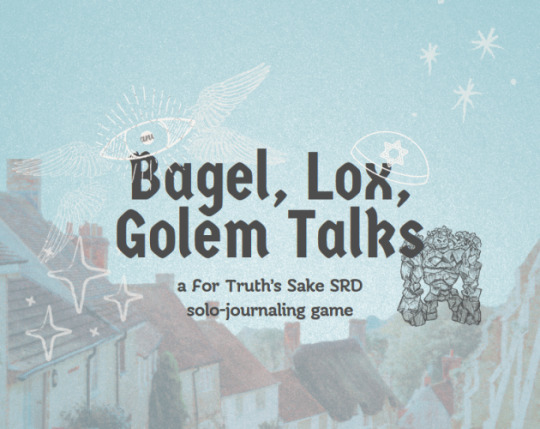
[ID: a cover image for a game. large brown text says "bagel, lox, golem talks" and smaller text says "a for truth's sake SRD solo-journaling game". the background is a faded photo of houses in a village. there are white stars, an eye with wings, a kippah with a star of david, and a golem on the image. end ID]
Bubbie Blumenthal has a leaky roof again. The leviathan in the river keeps lying its head on the thatch to sleep. Rebbe Ezra has instructed his golem to scare the thing off, to no avail. It’s a stubborn beast, even if it does seem to have a soft spot for the schoolchildren who feed it latkes on the way back from learning Talmud.
All you know is that you’ll need a new notebook soon with how eager all the old zaydes are to chat your ear off after a little post-Shabbos wine. One glass in, and every one of them claims a dybbuk encounter that week. Well, it’s good material. You’ll figure out how true it is after it goes in your field notes!
Bagel, Lox, Golem Talks is a solo-journaling game where you travel to a magical Jewish shtetl in order to learn more about the community and write an ethnography on them.
Pull cards to ask questions of the residents, roll dice to see how well interactions go, and get to know a host of colorful characters from young mensches, to golems, to nephilim, to the community rabbi. Unlock 12 different locations and gain levels in friendship and familiarity with the community as you document more and more in your field notes.
You'll need: A d20, d12, and d8, and a deck of playing cards
BLGT is a hack of For Truth's Sake by @hmooncreates
Get it now on itch! BLGT is free/pwyw!
#indie ttrpg#free game#journaling rpg#solo journaling game#jewblr#judaism#FINALLY BACK WITH A NEW GAME#AFTER. MONTHS.#a hack of for truths sake by h moon!!!#a very cool system!! please check it out!!#this was super fun to make
152 notes
·
View notes
Note
I am a Jewish high schooler and my school has a relatively high Jewish and Israeli population. However, I still found "From the river to the sea Palestine will be free #SaveGaza" on one side and "Free Palestine" on the other side of a bathroom stall, both in large writing with the former taking up all of my line of sight. It's scary and I don't think that high schoolers know the implications of their statements. I do agree that Palestinian people deserve freedom and rights. Of course I do. But the use of that statement is terrifying. I'm scared to tell anyone about it because a lot of my friends are very liberal and they kind of fell silent when me and an Israeli friend were talking about Israel. Nothing political, just about the markets in Tel Aviv and how my rabbi went to Israel recently (for political reasons I did not bring up because that wasn't what the conversation was about). I'm scared to tell my mom about the graffiti because she'll freak out. I don't know what to do. Should I report it through the school's anonymous page? Will it even get flagged as hate speech at all? Would the school be more concerned about the fact that it's graffiti than anything else? I do plan on writing "עם ישראל חי you are not alone" on the wall next to it but will that just be counterproductive and make me get in trouble if I report the other graffiti as well?
I'm so sorry you're going through that. I would agree that highschoolers do not know nearly enough to be commenting on such a complex situation with that much certainty. I'm also not sure what the best course of action is. I can say I'm not going to encourage what is technically vandalism, but I'm also not going to discourage it. I just hope you stay safe.
I do think talking about it with your parents might be the best course of action here, if you feel like your parents are trustworthy. I would usually say to talk to the teachers or the administration, but we've also seen that in many schools and colleges won't actually do anything to protect their Jewish students.
Best of luck and stay safe. Also stay together, there is safety (and comfort) in numbers.
71 notes
·
View notes
Text
I'm bored and stuck waiting and happened to remember that on my old blog I had made this statement:
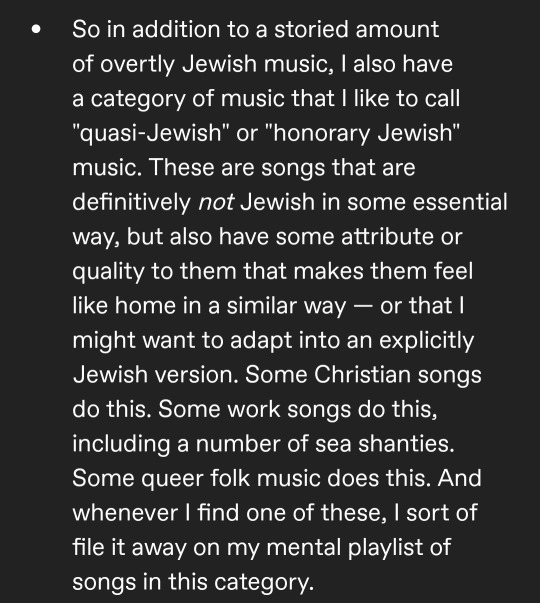
Since I have a minute, I figured I'd finally drop the list with some brief explanations:
1. By Way Of Sorrow - Coyote Grace version
This song and its lyrics, especially as sung by a queer/trans bluegrass band, could not be more Jew-ish in vibe. I am aware this is a cover, but I have only ever heard their version and that's the one that matters to me. I love love love this song, so much, and it perfectly captures how I feel about having been welcomed into the Jewish people after years of exclusion and othering from numerous other quarters. Am Yisrael has taken me in, treated me like family, connected me to the Divine, healed my wounds, and helped me feel as whole as one can in a broken and unredeemed world - while giving me the tools to join the work of tikkun olam myself.
2. The Farthest Field - The Lumber Jills version
This is the best version I could find; the original I was shown I can't find but will link if I do. This song was actually introduced to me by one of my orthodox rabbis, and I agree with him that it can be understood as a beautiful image of geulah.
3. Hallelujah - Coyote Grace & Girlyman
This one just makes me happy, and the words, message, and themes are very on-brand for Jewish vibes as well in my opinion.
4. Be Thou My Vision - old Irish Hymn (this version and this version are my favorites)
This one is very obviously a hymn and therefore decidedly Not Jewish. On the other hand, the words aren't so explicitly Christian that it rules out use by Jews (in my opinion) and especially if you translate the words into Hebrew, it sounds just like a traditional piyyut. (@springstarfangirl if you want to add your beautiful translation, please feel free!)
5. Down to the River to Pray - Alison Krauss
This is one where I do think the lyrics are a lot closer to being Christian specific, but it makes the list for a couple reasons: first, I've encountered it in Jewish-specific contexts without modification (one of our rabbis actually had us sing it like a regular song during zemirot), and second, there's a modified version by Nefesh Mountain that's quite enjoyable.
6. Whither Thou Goest - traditional
Yes, this one is a hymn too, but the words are directly quoting the Book of Ruth - her famous vows to Naomi, and to the Jewish people - and so it's already practically a Jewish song. It also has a special place of pride for me as a ger, and also because I used it as my wedding song in both the English (as heard in this version) and I also transliterated the Hebrew for our singer to do as well. It works nicely in both languages!
7. Roll the Ol' Chariot - David Coffin
This one I think is a little less direct, but I love it and included it for two reasons: first, it's a song of getting through it and surviving and thriving under tough circumstances, and second, you could very easily put liturgy to this melody instead.
8. For the Autumn Sky - traditional
Ignoring the last verse, this hymn could be very easily adapted into a beautiful Sukkot melody. For the last verse, I'd either simply leave it out, or one could write a Sukkot or Tu Bishvat themed verse to distinguish it. Incidentally, this was one of my favorite hymns growing up.
9. Sanctuary - Shaker melody
The video for this one is obviously mega-Christian, but it's on the list because we actually sing it all the time in shul and it has a special place in my memory from going to camp as a kid. Our shul is definitely not the only one who uses it in a Jewish context, either: this version by Cantor Julia Cadrain is really lovely.
10. Genesis 3:23 - The Mountain Goats
Where are my fellow Mountain Goats fans?? I know you're out there, lol. Look, I know that John Darnielle is coming at this from a Christian perspective, but two things: first of all, TMG has a number of Jewish fans I think at least in part because the lyrics speak deeply to the specific feelings around life (and other people) being horrible to you, surviving, and thriving even in the wake of deep trauma. Second of all, I think this one in particular brings up a number of interesting ideas about the meaning of home, of homecoming, of returning to a home that no longer really exists in the same way, and of exile and redemption. What would it look like to return to Gan Eden? Is this what geulah is supposed to look like, at least in some interpretations? What does it mean if not?
Anyway, this is it for now, but I may add to this list later, because there are definitely a few more! Please also feel free to add your own in the notes!
#queued post#jumblr#Jewish music#(kinda sorta)#honorary Jewish songs#Jewish Song of the Day#<<not really but for organizational purposes
59 notes
·
View notes
Text
Daily update post:
I have to start this one with the sad news that the hero who saved others by stopping the terrorist yesterday, despite being stabbed in several places (including in the neck), has passed away. His name was Uri Moyal, he was 51 years old, he leaves behind a wife and three kids. Yesterday, the number of wounded was still not fully clear, today it's confirmed that in addition to Uri, the terrorist managed to injure 2 more people. In the pic below you can see Uri holding up a lifetime achievement award. At his funeral today, his daughter Sapir mourned him: "Thank you for being a dad, who was also a teacher for life. There is no one who knew you and didn't fall in love with you."

The German press has reported (so far I've only managed to find this English source) that this week, the antisemitic, genocidal slogan "From the river to the sea" has been found painted in Arabic on the site of the 1972 kidnapping and massacre of 11 Israeli athletes by Palestinian terrorists. I'll point out that recently, the grandson of one of the murdered athletes was attacked (he had several bones in his face broken) in Berlin by an Arab anti-Israel activist.

A terrorist attack was prevented from happening, when two Palestinians, carrying a big knife and a sword, were arrested on their way to a Jewish community in the middle of the night. They're currently being questioned.

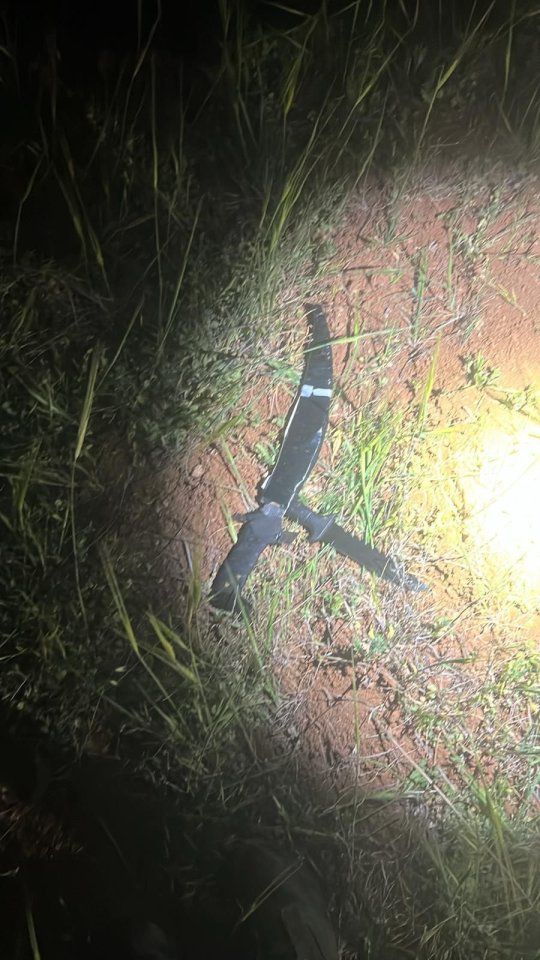
After Canada and Sweden, now Australia has also announced that it will renew its funding of UNRWA. I may sound like a broken record, but this is morally broken. They KNOW that UN agency is complicit in countless crimes of helping anti-Jewish hate and violence, the IDF evidence uncovered thanks to the war are just the tip of the iceberg when we're actually talking about decades of complicity, and resuming the funding without any changes, without even an investigation into this being completed, means these countries don't even care about looking as if they care about Jewish and Israeli lives. It's beyond ccontemptible. So. Canada, Sweden and now Australia, whenever these countries' heads tell you that they care about human rights, know that this includes, "but not for Jews."

And because I mentioned the long, long complicity of UNRWA (and many in charge of or dealing with it), here's the CEO of the NGO UN Watch explaining it better than most can, because they have been working for years on calling attention to the wrongdoing of UNRWA:
There's this common lie spread by the anti-Israel crowd, that everything was just peachy between Jews and Muslim in the Middle East, until Zionism came along. This is a blatant erasure of repeated discrimination, persecution, forced conversions, expulsions and massacres perpetrated against Jews living in Muslim majority countries for centuries. The ethnic cleansing of the entire Middle East of Jews (other than in Israel) is only the climax of that long history of antisemitism under Muslim rule, exactly like the Holocaust is just the climax of the long history of antisemitism under Christian European rule. And yesterday, I came across another reminder.
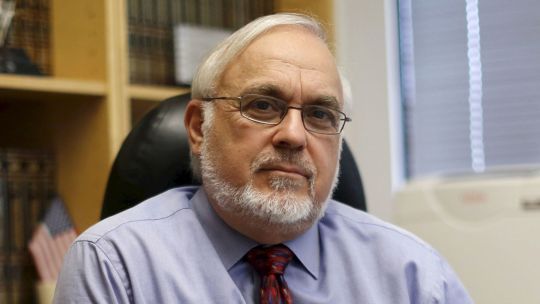
I was listening to an interview with Rabbi Abraham Cooper, an American rabbi, about the discrimination he had recently suffered during a trip to Saudi Arabia. I'd read the headlines, but hearing him tell it in his own words (in amazing Hebrew, might I add) really drove it home. He was heading a US delegation meant to inspect the state of religious freedom in Saudi Arabia, when he gets a phone call from the Saudi Ministry of Foreign Affairs, telling him that the Saudis have laws which must be respected, and which dictate that no one but "the members of our religion" (meaning, Muslims) can walk around publicly displaying signs of their religious identity. In other words, Rabbi Cooper was told to remove his kippah (the head cover religious Jews wear). Rabbi Cooper asked the official on the phone, whether he was sure, and tried arguing against this decision. When the demand was reaffirmed, Rabbi Cooper responded that he wouldn't take off his kippah for the Soviets decades ago, and he wouldn't be taking it off for the Saudis, either. That meant he had to leave, and so the delegation had to end its visit. This isn't a small incident of anti-Jewish discrimination in the 1930's, in an Arab country where no one would even bat an eye at that. This is a Saudi official, speaking to an American Jew, in 2024, during an official visit, meant to check the state of religious freedom in that country, while Saudi Arabia is doing its best to present a more tolerant, modern and progressive image for the world. And this still happened. There is a long tradition of antisemitism in the Middle East, it doesn't simply disappear even when Jews were forced to, and the attempts to deny it with the excuse of "But Zionism!" are antisemitic, too.

This is Hadar Gadol.

He's an Israeli author, a practitioner of alternative medicine, and as a reservist, he serves as a casualty officer (an army official who lets a family know that their loved one was killed in combat, in Israel a casualty officer also continues to work with and support the family after the initial notification, kind of like a social worker appointed by the army). In January, IDF soldier Mark Kononovich was killed. A few weeks ago, as party of taking care of the family, Hadar took Mark's dad Alex on a tour of the last army post where Mark and the friends who died with him had slept. In the middle of that, Hadar got a heart attack. Alex happens to be a doctor, he recognized the signs, administered some first aid, and made sure Hadar would be taken to the hospital to receive the treatment he needed. This is Hadar after being released from the hospital, visiting Alex to thank him (you can also see Mark's younger brother in the pic):
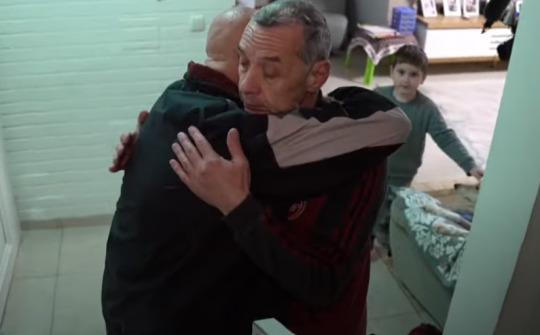
During this visit, Alex told Hadar, "You took our case as very close to you, you felt it like we do, very close to the heart." I have no doubt their bond is gonna be there for years to come. Hadar is actually not the first Israeli casualty officer I've heard of, who collapsed and was in need of hospitalization since Oct 7, just the latest. I think that in a way says something about how acutely Israelis feel the pain of the massacre, whether we personally lost someone or not.
(for all of my updates and ask replies regarding Israel, click here)
#israel#antisemitism#israeli#israel news#israel under attack#israel under fire#terrorism#anti terrorism#hamas#antisemitic#antisemites#jews#jew#judaism#jumblr#frumblr#jewish#unrwa#resources#un
81 notes
·
View notes
Text
By: Michael Powell
Published: Apr 22, 2024
Yesterday just before midnight, word goes out, tent to tent, student protester to student protester—a viral warning: Intruders have entered the “liberated zone,” that swath of manicured grass where hundreds of students and their supporters at what they fancy as the People’s University for Palestine sit around tents and conduct workshops about demilitarizing education and fighting settler colonialism and genocide. In this liberated zone, normally known as South Lawn West on the Columbia University quad, unsympathetic outsiders are treated as a danger.
“Attention, everyone! We have Zionists who have entered the camp!” a protest leader calls out. His head is wrapped in a white-and-black keffiyeh. “We are going to create a human chain where I’m standing so that they do not pass this point and infringe on our privacy.”
Privacy struck me as a peculiar goal for an outdoor protest at a prominent university. But it’s been a strange seven-month journey from Hamas’s horrific slaughter of Israelis—the original breach of a cease-fire—to the liberated zone on the Columbia campus and similar standing protests at other elite universities. What I witnessed seemed less likely to persuade than to give collective voice to righteous anger. A genuine sympathy for the suffering of Gazans mixed with a fervor and a politics that could border on the oppressive.
Dozens stand and echo the leader’s commands in unison, word for word. “So that we can push them out of the camp, one step forward! Another step forward!” The protesters lock arms and step toward the interlopers, who as it happens are three fellow Columbia students, who are Jewish and pro-Israel.
Jessica Schwalb, a Columbia junior, is one of those labeled an intruder. In truth, she does not much fear violence—“They’re Columbia students, too nerdy and too worried about their futures to hurt us,” she tells me—as she is taken aback by the sight of fellow students chanting like automatons. She raises her phone to start recording video. One of the intruders speaks up to ask why they are being pushed out.
The leader talks over them, dismissing such inquiries as tiresome. “Repeat after me,” he says, and 100 protesters dutifully repeat: “I’m bored! We would like you to leave!”
As the crowd draws closer, Schwalb and her friends pivot and leave. Even the next morning, she’s baffled at how they were targeted. Save for a friend who wore a Star of David necklace, none wore identifying clothing. “Maybe,” she says, “they smelled the Zionists on us.”
As the war has raged on and the death toll has grown, protest rallies on American campuses have morphed into a campaign of ever grander and more elaborate ambitions: From “Cease-fire now” to the categorical claim that Israel is guilty of genocide and war crimes to demands that Columbia divest from Israeli companies and any American company selling arms to the Jewish state.
Many protesters argue that, from the river to the sea, the settler-colonialist state must simply disappear. To inquire, as I did at Columbia, what would happen to Israelis living under a theocratic fascist movement such as Hamas is to ask the wrong question. A young female protester, who asked not to be identified for fear of retribution, responded: “Maybe Israelis need to check their privilege.”
Of late, at least one rabbi has suggested that Jewish students depart the campus for their own safety. Columbia President Minouche Shafik acknowledged in a statement earlier today that at her university there “have been too many examples of intimidating and harassing behavior.” To avoid trouble, she advised classes to go virtual today, and said, “Our preference is that students who do not live on campus will not come to campus.”
Tensions have in fact kept ratcheting up. Last week, Shafik called in the New York City police force to clear an earlier iteration of the tent city and to arrest students for trespassing. The university suspended more than 100 of these protesters, accusing them, according to the Columbia Spectator, of “disruptive behavior, violation of law, violation of University policy, failure to comply, vandalism or damage to property, and unauthorized access or egress.” Even some Jewish students and faculty unsympathetic to the protesters say the president’s move was an accelerant to the crisis, producing misdemeanor martyrs to the pro-Palestinian cause. A large group of faculty members walked out this afternoon to express their opposition to the arrests and suspensions.
As for the encampment itself, it has an intifada-meets-Woodstock quality at times. Dance clubs offer interpretive performances; there are drummers and other musicians, and obscure poets reading obscure poems. Some tents break out by identity groups: “Lesbians Against Genocide,” “Hindus for Intifada.” Banners demand the release of all Palestinian prisoners. Small Palestinian flags, embroidered with the names of Palestinian leaders killed in Gaza, are planted in the grass.
During my nine-hour visit, talking with student protesters proved tricky. Upon entering the zone, I was instructed to listen as a gatekeeper read community guidelines that included not talking with people not authorized to be inside—a category that seemed to include anyone of differing opinions. I then stood in a press zone and waited for Layla Saliba, a social-work graduate student who served as a spokesperson for the protest. A Palestinian American, she said she has lost family in the fighting in Gaza. She talked at length and with nuance. Hers, however, was a near-singular voice. As I toured the liberated zone, I found most protesters distinctly nonliberated when it came to talking with a reporter.
Leaders take pains to insist that, for all the chants of “From the river to sea” and promises to revisit the 1948 founding of Israel, they are only anti-Zionist and not anti-Jewish. To that end, they’ve held a Shabbat dinner and, during my visit, were planning a Passover seder. (The students vow to remain, police notwithstanding, until graduation in May).
“We are not anti-Jewish, not at all,” Saliba said.
But to talk with many Jewish students who have encountered the protests is to hear of the cumulative toll taken by words and chants and actions that call to mind something ancient and ugly.
Earlier in the day, I interviewed a Jewish student on a set of steps overlooking the tent city. Rachel, who asked that I not include a surname for fear of harassment, recalled that in the days after October 7 an email went out from a lesbian organization, LionLez, stating that Zionists were not allowed at a group event. A subsequent email from the club’s president noted: “White Jewish people are today and always have been the oppressors of all brown people,” and “when I say the Holocaust wasn’t special, I mean that.” The only outward manifestation of Rachel’s sympathies was a pocket-size Israeli flag in a dorm room. Another student, Sophie Arnstein, told me that after she said in class that “Jewish lives matter,” others complained that her Zionist beliefs were hostile. She ended up dropping the course.
This said, the students I interviewed told me that physical violence has been rare on campus. There have been reports of shoves, but not much more. The atmosphere on the streets around the campus, on Broadway and Amsterdam Avenue, is more forbidding. There the protesters are not students but sectarians of various sorts, and the cacophonous chants are calls for revolution and promises to burn Tel Aviv to the ground. Late Sunday night, I saw two cars circling on Amsterdam as the men inside rolled down their windows and shouted “Yahud, Yahud”—Arabic for “Jew, Jew”—“fuck you!”
A few minutes earlier, I had been sitting on a stone bench on campus and speaking with a tall, brawny man named Danny Shaw, who holds a master’s in international affairs from Columbia and now teaches seminars on Israel in the liberated zone. When he describes the encampment, it sounds like Shangri-la. “It’s 100 percent love for human beings and very beautiful; I came here for my mental health,” he said.
He claims no hatred for Israel, although he suggested that the “genocidal goliath” will of course have to disappear or merge into an Arab-majority state. He said he does not endorse violence, even as he likened the October 7 attacks to the Warsaw Ghetto uprising during World War II.
Shaw’s worldview is consistent with that of others in the rotating cast of speakers at late-night seminars in the liberated zone. The prevailing tone tends toward late-stage Frantz Fanon: much talk of revolution and purging oneself of bourgeois affectation. Shaw had taught for 18 years at the John Jay College of Criminal Justice, but he told me the liberated zone is now his only gig. The John Jay administration pushed him out—doxxed him, he said—in October for speaking against Israel and for Palestine. He was labeled an anti-Semite and remains deeply pained by that. He advised me to look up what he said and judge for myself. So I did, right on the spot.
Shortly after October 7, he posted this on X: “Zionists are straight Babylon swine. Zionism is beyond a mental illness; it’s a genocidal disease.”
A bit harsh, maybe? I asked him. He shook his head. “The rhetoric they use against us makes us look harsh and negative,” Shaw said. “That’s not the flavor of what we are doing.”
We parted shortly afterward. I walked under a near-full moon toward a far gate, protesters’ chants of revolution echoing across what was otherwise an almost-deserted campus. I could not shake the sense that too many at this elite university, even as they hoped to ease the plight of imperiled civilians, had allowed the intoxicating language of liberation to blind them to an ugliness encoded within that struggle.
[ Via: https://archive.today/ziQes ]
==
At the core of what they call "anti-Zionism" is the belief that "Jews control the world." Left-wing conspiracy nuts and right-wing conspiracy nuts are now collaborating, it seems.
Zionism | ˈzīəˌnizəm |
noun
a movement for (originally) the re-establishment and (now) the development and protection of a Jewish nation in what is now Israel. It was established as a political organization in 1897 under Theodor Herzl, and was later led by Chaim Weizmann.
Somehow this justifies slaughtering over a thousand, raping dozens, and kidnapping hundreds. And for brain cell-starved students to defend and support terrorists who would happily slit their throats.
It's hard to take the "we're anti-Zionism, not anti-Jew" thing when they intimidate and attack Jews without bothering to ask them what they think. In reality, it's just cover for their antisemitism. When they don't make the distinction, we should stop pretending it's a distinction at all.
#Michael Powell#Columbia University#useful idiots#hamas#hamas terrorism#hamas supporters#pro hamas#student protesters#student protestors#antisemitism#israel#palestine#pro palestine#islamic terrorism#islam#religion is a mental illness
39 notes
·
View notes
Text

“Everything in the Universe is within you.” ~Rumi
"You are part of the Universe; you are made of stars... We are the mountains and rivers.. Everything inter-is..." ~Thich Nhat Hanh
"The real "you" is not a puppet which life pushes around. The real deep down YOU.. is something that the Whole Universe is doing, in the same way that a wave is something that the Whole Ocean is doing..." ~Alan Watts
"The soul given to each of us is moved by the same living spirit that moves the Universe." ~Albert Einstein
"Empty yourself of everything. Let the mind become still. The ten thousand things rise and fall while the Self watches their return. They grow and flourish and then return to the Source. Returning to the Source is stillness, which is the way of nature." ~Lao Tsu, Tao Te Ching
“To the ignorant, the "I" is the self limited to the body; to the wise, the "I" is the Infinite Self. One who turns inward with an untroubled mind to search where the consciousness "I" arises, realizes the Self, and rests in "That" like a river when it joins the ocean. Take no notice of the ego and its activities, but see only the light behind.” ~Ramana Maharshi
“The mind that seeks to fill the hole is the same delusional mind that is digging it. Spiritual practice conspires to strip away everything you use to maintain the illusion of certainty, security, and self-identity. To paraphrase Albert Einstein: We cannot solve problems with the same mind that created them.” ~Rabbi Rami M. Shapiro
"Buddhas and all sentient beings are the One Mind and nothing else. This Mind is no mind of conceptual thought and it is completely detached from form. So Buddhas and sentient beings do not differ at all. If students can only rid themselves of conceptual thought, all will become clear..” ~ Huang Po, Zen Patriarch
"One Being is the Source of all creatures. The life of that Being shines through the multiple prisms of diverse worlds, refracting, reflecting, becoming the many, yet remaining ever one in essence, like the colors of a spectrum or the cells of a body. The distinction between you and this Being is not absolute but organic, like the distinction between leaves on a tree or the distinction between notes that contribute to the harmonies of a song. Behind your individuality, beneath your cultural illusions of self, that Being is who you are." ~Ken Carey
Painting: Cosmic Balance by Sam Brown Art
Tao & Zen
30 notes
·
View notes
Note
i had a question about the religion vs tribal post u reblogged earlier. does this mean converts dont have to be particularly religious? or can converts only convert if they want like. the full religious experience (i am wording this very poorly my apologies) like. can someone convert if they want to simply be a jew, and not just because of the religious aspects? idk
the tldr is no, jews by choice don't have to meet any certain level of religious observance to maintain their jewish status post-mikveh. once they've been approved by a beit din and immersed in a mikveh, they are unquestionably jewish.
that being said, i got a little over excited and wrote up a whole thing about the process and legality of jewish conversion so buckle up buttercups.
the process of conversion is long, usually at least one full year, and supervised by a rabbi. the conversion student meets with their sponsoring rabbi throughout the year so the rabbi can monitor their progress and education, assess their motivations and character, offer them guidance and support, and finally to determine when/if they are ready to go before a beit din and complete their conversion. this isn't something the conversion student requests, it's something that can only be approved by their sponsoring rabbi.
the process and expectations, along with what's considered a valid or halachic conversion, differ depending on which community the conversion student is petitioning to join. for example, most orthodox and conservative communities still require circumcision or hatafat dam brit in order for a conversion to be valid while reform and reconstructionist do not. the standards for what it means to commit to living a jewish life will also be different depending on the community. someone who converts with a sephardic rabbi may follow different rabbinic rulings than someone who converted with an ashkenazi rabbi.
once the sponsoring rabbi has determined that the conversion student is genuine and is ready to complete conversion, the conversion student will appear before a beit din which consists of three jews who are educated in jewish law, at least one of whom must be a rabbi. (usually all three are rabbis, but i've been on two beit dins and am definitely not a rabbi.) the beit din then determines if the conversion student is sincere, knowledgeable, and making this decision of their own free will. they may ask the convert some questions to determine their basic knowledge of jewish law, ask the convert to tell them about their journey to judaism and why they want to become jewish, and will very often ask if the convert is fully prepared to join a historically oppressed people. i have been on two beit dins and one question i've asked both times is if they have a support system to help them navigate their new identity and the discrimination they're very likely to face. the crux of the beit din is "do you know what you're getting yourself into?"
if the beit din determines that the convert is not ready, they will turn them away. usually, this means they'll try again in the future, but sometimes the person decides that conversion is not for them. that being said, since the sponsoring rabbi has to determine first if you're ready for the beit din, it's very rare for someone to be turned away at that point. (though my rabbi has some very....odd stories about people who have put on an act for years to convert, only to go on and on about jesus to the beit din. needless to say those people are expeditiously sent away.)
if the answer is yes, the convert will then immerse in a ritual bath called a mikveh. most often people will go to an indoor mikveh, but sometimes converts will opt for a lake, river, ocean, etc. that's deemed acceptable. after they leave the mikveh, they are jewish. they've received their "jewish citizenship" and their status as a member of the jewish people cannot be questioned. (with the caveat that different communities don't always accept conversions from other communities, and there are some that don't accept conversion at all. and of course, just because something is a violation of jewish law doesn't mean people don't still do it. there is still a lot of anti-convert rhetoric within the jewish community that we have to reckon with.)
once someone becomes jewish, it's up to them the kind of life they want to live. if someone underwent an orthodox conversion, it's probably because they wanted to live an orthodox jewish life so it's unlikely they will leave the mikveh and never set foot in a synagogue again, especially considering for orthodox conversion it's generally expected that by the time you go before a beit din you have been living an orthodox jewish life and live in an orthodox jewish community for at least a year. that being said, if they did decide to adjust their observance or find they prefer a different community, or even if they decided they no longer wanted to be observant at all, they would still be jewish according to jewish law. the only time the semantics would change is if they converted to a different religion, in which case most communities would consider them a jewish apostate. if someone converted through a non orthodox community and wanted to join an orthodox jewish community, they would have to undergo an orthodox conversion.
conversion to judaism is compared to naturalization a lot because it's very similar. you go through a process, prove you are ready to be a citizen and are knowledgeable about the country you're petitioning to be a citizen of, then once you gain your citizenship it cannot be revoked, including if you break the law. if you gain your american citizenship under the expectations that you will respect the laws of the land, then run 10 red lights, you're still an american citizen you're just a citizen with 10 traffic tickets. similarly, in my opinion, if you gain your "jewish citizenship" under the expectation that you will follow the laws of the community, then eat a plate of bacon, you're still a jew you're just a jew who has violated halacha. if we wouldn't revoke the jewish status of someone who was born to a jewish family for eating a plate of bacon, i would argue it's similarly inappropriate to try to revoke the jewish status of someone who converted for eating a plate of bacon.
however, there have been instances where a conversion has been retroactively deemed invalid. however, there was, in true jewish fashion, much debate about what could invalidate a conversion. in this essay submitted to and accepted by the rabbinic counsel, the determination was made that if the conversion in question was obtained by deceit and the rabbi and beit din did their due diligence in determining the motives of the conversion student, the conversion can be deemed invalid. if the conversion was obtained by deceit and the rabbi and beit din did not do their due diligence, the conversion remains valid, regardless of the motivations and deceit.
something i see mentioned a lot when it comes to conversion and observance after conversion is the argument that if someone takes on the commandments during their conversion then doesn't follow them, or they are pursuing conversion only to gain and/or weaponize jewish identity, they are deceiving the beit din and therefore their conversion should be invalid. i get the logic, but i also agree with what the above essay has to say. the responsibility lies with the rabbi and beit din to determine the motivations of the convert. the moral failure of deceit can be attributed to the convert, but the legal responsibility still lies with the rabbi and beit din. we can question all day long why someone would want to convert if they aren't going to do x, y, and z, but at the end of the day if a rabbi and beit din have supervised and approved their conversion, it's a done deal. their conversion cannot be revoked by a court of public opinion.
it's something that i think is very difficult to grapple with because i don't think any of us want someone to lie their way into our community. given our history of persecution, i think it's understandable how scary that could be. that being said, conversion is not an issue of morals but of jewish law, so in conclusion of this essay no one asked for, i think that it's not the responsibility of the community at large to determine if someone's conversion is valid or to question they way they live their life. that opens the door to a sort of mob justice that jews by choice already have to deal with constantly. it's the responsibility of the sponsoring rabbi and beit din to determine if the person seeking conversion is a good candidate.
234 notes
·
View notes
Text
ON OCTOBER 27TH, after roughly three weeks of campus turmoil surrounding student responses to Hamas’s October 7th attacks and the ensuing Israeli bombardment of Gaza, Harvard president Claudine Gay announced at a Shabbat dinner at Harvard Hillel that she was establishing an advisory group to guide her efforts to combat antisemitism on campus. In a November 9th email, she unveiled its members, a collection of Harvard administrators, alumni, professors, and affiliated rabbis. Her message to the campus community laid out some of the group’s initial plans, including “a robust program of education and training for students, faculty and staff on antisemitism broadly and at Harvard specifically.” The email also offered a clue as to the task force’s orientation: Gay noted that the training would address “the roots of certain rhetoric that has been heard on our campus in recent weeks.” It specifically condemned the phrase “from the river to the sea,” a pro-Palestine slogan that she said conveys “specific historical meanings that to a great many people imply the eradication of Jews from Israel and engender both pain and existential fears within our Jewish community.”
But while Gay’s letter suggests that the task force will explore what she casts as a worrisome relationship between antisemitism and activism for Palestinian rights, none of its members have conducted scholarly research into this supposed intersection. Most notably absent from the advisory group was Derek Penslar, the director of Harvard’s Center for Jewish Studies and a leading scholar of Zionism and its critics. His acclaimed recent book, Zionism: An Emotional State, includes a chapter entitled “Hating Zionism,” on the different motivations that have driven Zionism’s opponents since its creation. Given the relevance of his scholarship, Penslar would have seemed an obvious choice for the advisory group. But according to four faculty members familiar with Jewish studies at Harvard who requested anonymity to discuss internal university affairs, not only was he not selected, he wasn’t even consulted. One professor compared snubbing Penslar to “creating a task force on AI without consulting the chair of the department of computer science.”
Why wasn’t Penslar chosen? One likely factor is that he signed the Jerusalem Declaration on Antisemitism (JDA), which states that “criticizing or opposing Zionism” is not necessarily antisemitic. By contrast, most of the people appointed to the advisory group—none of whom have Penslar’s expertise—have made public statements alleging that anti-Zionism is antisemitic, or are affiliated with organizations that hold that view. Though Gay’s email claims that the advisory group is committed to “bringing our teaching and research mission” to bear in the fight against antisemitism, the group’s composition suggests that its members were selected less for their scholarly credentials than for their political beliefs, which align with those of influential donors, some of whom have already withdrawn funding or have threatened to do so.
—Harvard Is Ignoring Its Own Antisemitism Experts
#politics#palestine#israel#claudine gay#derek penslar#harvard#gaza#education#antisemitism#anti zionisim#antizionism ≠ antisemitism#anti zionism ≠ antisemitism#october 7#october 7th#bds#boycott divest sanction#genocide#never again#never again to anyone
56 notes
·
View notes